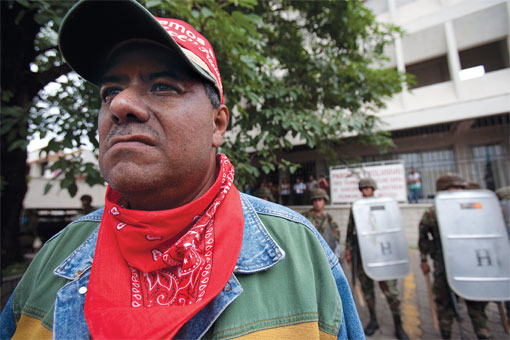When more than 200 soldiers stormed the house of Honduran President Manuel Zelaya on June 28, rousted him out of bed, and gave him a one-way ticket to Costa Rica, Latin America had a gut-wrenching sense of déjà vu. In the first successful military coup since the Cold War, the region’s long nightmare with de facto governments had stunningly been reconjured in tiny, impoverished and all-but-ignored Honduras.
Two days later, I entered the country to report the story by trekking across a bridge from El Salvador in a 6:00 a.m. downpour. All flights to Tegucigalpa, the capital, had been cancelled. History gave me every reason to expect the worst: death squads, torture, “disappearances,” and other tactics of state terror had always accompanied coups in the region.
But the atmosphere that Tuesday was hardly sinister. A few helicopters buzzed overhead, and soldiers manned government buildings. Yet the streets bustled and stores were open for business. While international condemnations of the coup scrolled across the CNN en Español news ticker in every hotel lobby, young locals seemed to have adapted quickly to the 9:00 p.m. curfew, heading to bars and dance clubs while their parents were still eating dinner.
Most surprising, many residents seemed to be cheering. On the morning I arrived, thousands of demonstrators wearing white T-shirts and waving plastic national flags filled Parque Morazán, the city’s central square, to express their support for the new leadership. Although the crowd clearly skewed toward the young, affluent and white, most walks of life were represented.
“We don’t want Mel! Go away, Mel!” bellowed the crowd, using the nickname the former timber magnate inherited from his father. Zelaya was accused of being an aspiring dictator, a drug trafficker—but above all, of being a pawn of Hugo Chávez. One poster depicted the Venezuelan president dragging a crawling Zelaya, with a Soviet hammer and sickle inscribed on his signature Stetson hat, by a dog collar. The applause turned particularly raucous when Roberto Micheletti, president of the de facto government, showed up, surrounded by a gaggle of soldiers in camouflage and wielding submachine guns…





